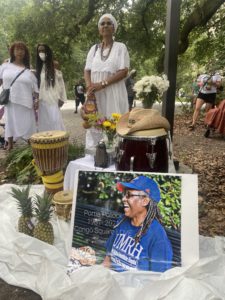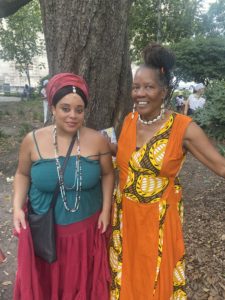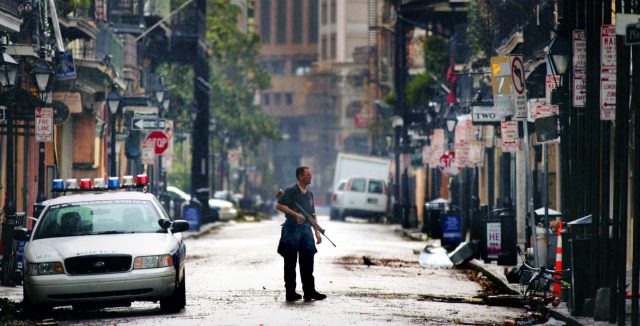Residents of New Orleans don’t trust the police. Credit: Carolyn Cole/Los Angeles Times via Getty Images

Portia Pollock was 60 years old when she was murdered outside her home. She was a physical therapist who loved working with elderly folk in care homes. She also loved drumming. So I learned about her life and brutal death when I walked into New Orleans’s Louis Armstrong Park five days later and heard the sound of music.
More than two dozen people were pounding djembes in rhythmic unison in the scorching heat, while one woman in a straw hat played a flute, another tapped a tambourine and a third danced in the drumming circle.
One participant explained that I had stumbled upon a Sunday afternoon tradition in “the most African city of America”. This was Congo Square, where slaves could meet on Sundays to eat their own food, sing their own songs, speak their own tongue and sell their own goods, some earning enough to buy freedom. Jazz musician Wynton Marsalis says “every strand of American music comes directly from Congo Square” and I was witnessing a group that pays homage to this heritage.
Portia, though, was missing. Her portrait was there, on a white sheet: a woman with a big smile in a blue T-shirt, greying dreadlocks pushed behind one ear. This image sat beside her drums, her harmonica, her hat and some flowers as incense burned. Another picture of was at the foot of a huge oak tree, surrounded by more flowers, fruit and vegetables left by her friends and fellow drummers. “Today, we pour libations. We remember her. We remember Portia Pollock,” said her friend Denise Graves.

Her killing made waves: a respectable older woman stabbed in the street in a car-jacking on her way to work, not a teenager gunned down in an area riddled with crime and poverty. “That could’ve been my mother,” commented New Orleans police chief Shaun Ferguson.
But she was just another fatality in a rising tide of violence plaguing not just this Louisiana city, but the entire United States; I arrived in New Orleans from Austin, Texas, where a late-night shooting just down the road from my hotel had left one dead and 13 injured. National statistics are not yet released but preliminary data shows homicides rose almost one third in major cities last year — the largest recorded rise in the nation’s history — and carried on surging this year, up another 18.5%, according to latest figures.
This rise in killings — seen in cities big and small, red and blue, north and south — threatens to unravel one of the most remarkable success stories of this century: the decline in violent crime. Several cities, including Chicago, suffered their highest homicide rates for nearly three decades. New York recorded a 45% murder increase last year and near-doubling of shooting incidents. As a result, crime is also rising up the political agenda. In the New York mayoral battle, Eric Adams, a former cop who campaigned on public safety, looks set to be the surprise winner of the Democratic primary.
New Orleans, a city about the size of Coventry, has long suffered some of the highest murder rates in the US. After a dip in 2019, it experienced a 60% leap last year with 195 killings and have so far risen this year at higher rates than the national level. Carjackings, where victims tend to be random, more than doubled in 2020.
The city is still recovering from the traumas of the biggest residential disaster in US history. When the city’s levees failed during Hurricane Katrina in 2005, hundreds drowned and most households had to relocate, often for months. Today, the city has 100,000 fewer residents. The disaster also led to imposition of an educational experiment: its low-performing public schools were replaced by a charter system — similar to our free schools — based on choice. Test results have improved. But I was also told this policy lay at the heart of many problems, since kids from poor, black and troubled backgrounds were kicked out of classrooms rather than helped by local teachers from their own backgrounds.
“After Katrina large sums of money were spent on improving security in schools, since there was the thought young people would come back traumatised and unruly,” said Gina Womack, 59. “The schools were still in a horrible condition but there were police, more security, more suspensions. We prioritise policing and patrolling over support for struggling families. It shows how as a society we are quick to blame but we ignore the problems of our youth.”
Womack founded a group to keep kids out of prison in Louisiana: “I am a black single mum of three children and I did not want them to end up in an unjust system,” she tells me. And describes how, when the pandemic struck it exposed, with ruthless efficiency, inequalities in education, housing and income, especially in a city that relied for so many jobs on events and hospitality. “Life has been tougher and it’s been really hard for many families with everyone at home,” she says. “There have been many conversations around the loss of life, first through Covid and now homicide — which happens in impoverished communities under stress.”
Flozell Daniels agrees. He’s head of the Foundation for Louisiana, which spent millions rebuilding communities after Katrina. He believes that many people, often still traumatised by the catastrophe, were subject to extreme pressure by the pandemic in a place which already had a profound lack of faith in government and deep distrust for the police. “Black people do not trust them to keep us safe,” he said. “George Floyd’s death may have been surprising for white people but we knew there was this culture of violence in a system failing black people.”
Others had different reactions. Denise Graves, Portia’s close friend, told me about one black boy from a prosperous family: “He said ‘I’d never understood police brutality, I’d always thought someone shot must have been doing something wrong so I tried to do everything right — but now I realise my skin colour makes me a target.” Graves, a community pastor in her mid-sixties, has raised five boys; she grew up in a tough part of Los Angeles, but said “every night one of them was out of my sight I was terrified”.

Such attitudes cannot be healthy for any society, let alone one as fissured and flooded with firearms as America. A Gallup survey last summer found confidence in police had plunged to its lowest level since the firm started tracking such data almost three decades ago. Yet it also exposed the nation’s divisions: trust actually rose among Republicans to 82% while falling to 28% among Democrats.
Chabre Johnson, 36, works on the frontline. She’s a project manager with Youth Empowerment Project, a scheme that has helped many young people in New Orleans but has also seen some of its kids murdered or jailed. In the last month alone, a 12-year-old girl and 10-year-old boy have been slain in separate city shootings. So many of the children and teens she works with have seen bodies, heard gunshots and have relatives in prison. “They get tired of trying to do the right thing when everything is stacked against them.”
Johnson believes the dehumanising effect of technology — accelerated in the pandemic — has had a devastating impact. “I think the value of life and self-worth has declined.” The kids she works with are taking less interest in their appearance, and are more interested in the destruction of property and using drink or drugs to blot out problems. She worries too that schoolyard beefs are inflamed on social media and families have lost their ability to control children: “Kids tells parents that if they are not allowed out they will call the police and say they are being kidnapped. Young people do not fear anything.”
These children are growing up in a city with a history of violence, remarked upon even by the Times war reporter William Howard Russell when he visited in 1861, and the causes are complex. But Flozell Daniels argues that his country does not care about young black men killing each other, becoming alarmed only when violence spills out to affect middle-class people such Pollock. As we drink coffee in a bookshop in a poorer part of town, he explains that these issues are deeply personal: his son was shot dead five years ago at the age of 20 in a murder that has never been solved.
His family thinks they know the killer, now in prison for another attempted murder. This exposes another corrosive issue in black and impoverished communities: low clear-up rates, currently at 36% in New Orleans for murder, despite evidence many proven killers are linked to other violent crimes. “We spent the first couple of years offering the police information, doing our own investigations, offering a reward. We kept calling the police but they never reacted. They were disrespectful — they said he must have been doing something bad to have been killed,” said Daniels. “I am sure that if it had been a 20-year-old white girl from upstate they would have found her killer quickly.”
Jill Leovy wrote that this issue of impunity for killers of black men was her nation’s “great, though mostly invisible, race problem” in Ghettoside, her brilliant book on homicide. She pointed out that black men comprised about 6% of the population but 40% of homicide victims, arguing that efforts to combat this mostly black-on-black murder epidemic had a dark history of dismissal by authorities that remained “inept, fragmented, underfunded, contorted by a variety of ideological, political and racial sensitivities.” The Californian journalist concluded that when the criminal justice system failed to respond strongly to violent injury and death, such issues become endemic.
The New Orleans police, their union and the district attorney declined to discuss these issues —although as one youth worker said, who would want to be a cop in the current climate? Many commentators and police leaders, however, have jumped on the homicide figures to argue this is the inevitable consequence of demonising the police as “genocidal oppressors of minorities”, thereby reducing their confidence to tackle violent criminals. Such claims are undercut by data showing little difference in murder rates in cities regardless of which party is in charge, despite widely differing policies. The rise also started soaring in June last year, three months after the first lockdowns, so cannot simply be blamed on bored teenagers hanging around streets when schools closed.
Jeff Asher, a crime analyst based in New Orleans and former adviser to the city authorities, was among the first to highlight the alarming murder surge. He points out that police have been making fewer arrests for years as part of the trend to reduce incarceration and soften drug policies — down from about 60,000 a year in 2010 in his home city to some 17,000 the year before the pandemic. So the rise in killings is unlikely to be due to sudden police retrenchment. “De-policing could be a contributing factor but it has been going on for a decade,” he said.
The former CIA officer thinks “anyone giving a single answer to this complicated question is wrong”. He believes it may be part of a cycle of violence and mistrust that has seen cops pulling back, perhaps to more peaceful streets, which fed into existing mistrust of police in more troubled areas. This ends up with more people taking disputes into their own hands, a situation made worse amid the stresses and tensions of a pandemic. “People are not willing to depend on the criminal justice system when they do not see it as something neutral that treats them fairly.”
Asher backs his argument with another alarming set of figures showing more guns being carried. We know sales boomed last year, with many first-time buyers. But he shows me that more firearms were found by police in early months of the pandemic last year, despite arrests and stops falling sharply, and then the figures rose again after Floyd’s murder and the protests at the end of May. In Chicago, for example, police stops fell two thirds between January and May 2020 — yet they found almost twice as many guns at the end of that period as at the beginning. Similar patterns can be detected in other cities, suggesting this was another legacy of deteriorating trust that coincided — or could have been fuelled — by the pandemic.
Asher points out that there was no rise in killings in Baltimore since trust of the authorities in this city wrecked by gang warfare was already shot to pieces. “George Floyd was the spark, not the cause. The poorest communities have been over-incarcerated, subjected to gun violence for generations and then hit hardest by pandemic. We have too many firearms and policing needs reform — but it’s hard to rebuild trust.”
Yet he also says it is simplistic for the Left to blame Donald Trump’s presidency for such deep societal problems. “One administration does not cause children shooting at police, everyone carrying guns, police becoming less willing to engage and communities historically underserved seeing enormous eruption in violence.” So is this, ultimately, a racial issue, I asked? “Everything in America goes back to our original sin,” he replied.










Join the discussion
Join like minded readers that support our journalism by becoming a paid subscriber
To join the discussion in the comments, become a paid subscriber.
Join like minded readers that support our journalism, read unlimited articles and enjoy other subscriber-only benefits.
Subscribe